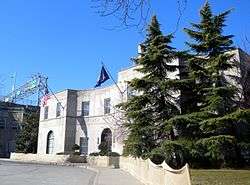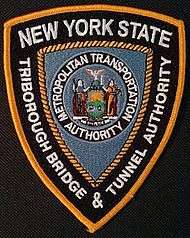MTA Bridges and Tunnels
|
| |
| Public benefit corporation | |
| Founded | New York State (1933) |
| Headquarters | 2 Broadway, New York, NY, 10004 |
Area served | New York City |
Key people | James Ferrara, President |
| Revenue | US$ 437,200,000 (2010)[1] |
| US$ 586.5 million (2013) | |
Number of employees | 1,545 |
| Parent | Metropolitan Transportation Authority |
| Website | Official website |
The Triborough Bridge and Tunnel Authority, doing business as MTA Bridges and Tunnels, is an affiliate agency of the Metropolitan Transportation Authority, that operates seven intrastate toll bridges and two tunnels in New York City. In terms of traffic volume, it is the largest bridge and tunnel toll agency in the United States serving more than a million people each day and generating more than $1.5 billion in toll revenue annually as of 2012.[2]
The seven bridges are:
- Triborough Bridge (officially Robert F. Kennedy Bridge), the agency's original namesake and flagship crossing, connecting Manhattan, the Bronx, and Queens, via Randalls and Wards Islands
- Bronx–Whitestone Bridge, connecting the Bronx and Queens
- Verrazano–Narrows Bridge, connecting Brooklyn and Staten Island
- Throgs Neck Bridge, connecting the Bronx and Queens
- Henry Hudson Bridge, connecting Manhattan and the Bronx
- Marine Parkway–Gil Hodges Memorial Bridge, connecting Brooklyn and the Rockaways (Queens)
- Cross Bay Veterans Memorial Bridge, connecting Broad Channel to the Rockaways (Queens)
The two tunnels are:
- Brooklyn-Battery Tunnel (officially Hugh L. Carey Tunnel), connecting Brooklyn and Manhattan
- Queens–Midtown Tunnel, connecting Queens and Manhattan
History
Originally named the Triborough Bridge Authority, the authority was created in 1933 as a public-benefit corporation by the New York State Legislature. It was tasked with completing construction of the Triborough Bridge, which had been started by New York City in 1929 but had stalled due to the Great Depression.
Under the chairmanship of Robert Moses, the agency grew in a series of mergers with four other agencies:
- Henry Hudson Parkway Authority, in 1940
- Marine Parkway Authority, in 1940
- New York City Parkway Authority, in 1940
- New York City Tunnel Authority, in 1946
With the last merger in 1946, the authority was renamed the Triborough Bridge and Tunnel Authority. Generating millions of dollars in toll revenue annually, the TBTA easily became a powerful city agency as it was capable of funding large capital projects. From the 1940s-60s, the TBTA built the Battery Parking Garage, Jacob Riis Beach Parking Field, Coliseum Office Building and Exposition Center and East Side Airlines Terminal,[3] as well as many parks in the city.

The TBTA was merged into the Metropolitan Transportation Authority in 1968. Surplus revenue, formerly used for new automobile projects, would now be used to support public transportation. [4] Since then, more than $10 billion has been contributed by the TBTA to subsidize mass transit fares and capital improvements for the New York City Transit, Long Island Rail Road, and Metro-North Railroad. The MTA Bridges and Tunnels trading name was adopted in 1994.[5] The name Triborough Bridge and Tunnel Authority is still the legal name of the Authority and was used publicly between 1946 and 1994.
Law enforcement

The Triborough Bridge and Tunnel Authority (TBTA) employs 966 Bridge and Tunnel Officers (BTOs), who are NYS Peace Officers authorized to make arrests and carry firearms on and off duty. BTOs patrol the authority's 9 facilities on foot and in marked patrol cars. Besides law enforcement, the BTOs collect tolls, assist vehicles stuck in E-ZPass lanes, operate tow trucks to clear disabled vehicles, and clear snow from the roadways. The TBTA also has a Special Operations Division/Collision Reduction Unit, which enforces all aspects of the New York State Vehicle and Traffic Law and NYC Traffic Rules with a main emphasis on speed enforcement.
In 2007, Bridge and Tunnel Officers were involved in two shootings, on the Triborough and Bronx Whitestone Bridges. They also assisted in the delivery of a newborn baby.
Toll rates
E-ZPass rates are for tags issued by the New York Customer Service Center only. Tolls are charged in both directions unless otherwise noted. All rates are effective on March 22, 2015.[6]
The old gates will set to be removed from the two tunnels in January, according to a spokesman for the MTA, which oversees the bridges and tunnels. All the bridges will have their gates removed next, and the rest will be operating on a cashless basis by the end of 2017.
| Crossing(s) | Cars | Vehicles over 7,000 lbs GVWR | Motorcycles | Resident Programs | Franchise Buses (EZ-Pass) |
Notes | |||||
|---|---|---|---|---|---|---|---|---|---|---|---|
| Cash | EZ-Pass | Cash | EZ-Pass | Cash | EZ-Pass | Token | EZ-Pass | Carpool | |||
| Robert F. Kennedy (Triborough) Bridge Throgs Neck Bridge Bronx–Whitestone Bridge Queens Midtown Tunnel Hugh L. Carey (Brooklyn–Battery) Tunnel |
$8.00 | $5.54 | $16.00 | $10.00 | $3.25 | $2.41 | None | $4.01 (2 axles) $4.76 (3 axles) |
No toll for vehicles leaving Randall's Island (RFK Bridge only). Each additional axle is $9 Cash or $6.14 EZ-Pass. | ||
| Verrazano–Narrows Bridge | $16.00 | $11.08 | $32.00 | $20.00 | $6.50 | $4.82 | $8.87 | $6.24 or $6.60 |
$3.08 | $8.02 (2 axles) $9.52 (3 axles) |
Tolls are charged westbound only. Carpools must use cash lanes. Residents must live on Staten Island to receive discount. Resident EZ-Pass discount is $6.36 for 1-2 trips per month and $6.00 for 3+ trips per month. Each additional axle is $18 Cash or $12.18 EZ-Pass. |
| Henry Hudson Bridge | $5.50 | $2.54 | Not allowed | $3.25 | $1.73 | None | Bridge is closed to all commercial traffic. Vehicles without EZ-Pass are sent a bill by mail. | ||||
| Marine Parkway Bridge Cross Bay Bridge |
$4.00 | $2.08 | $8.00 | $5.00 | $3.25 | $1.73 | $1.86 | $1.36 | None | $2.00 (2 axles) $2.51 (3 axles) |
Residents must live in Rockaway or Broad Channel to receive discount. Each additional axle is $4.50 Cash or $3.07 EZ-Pass. |
Prohibited traffic
Part 1022 of the Rules and Regulations Governing the Use of the Triborough Bridge and Tunnel Authority Facilities prohibits certain types of vehicles, such as:[7]
- Vehicles with flat, solid, or metal tires
- Bicycles on the roadways. Bicycles may be walked across the Cross Bay Veterans Memorial Bridge, the Marine Parkway-Gil Hodges Memorial Bridge, and the Triborough Bridge
- Mopeds
- Horses and horse-drawn vehicles
- Trucks and other non-passenger autos on the Henry Hudson Bridge
See also
References
- ↑ MTA BudgetWatch May 2010 (PDF), Metropolitan Transportation Authority, retrieved 2010-05-30
- ↑ http://web.mta.info/mta/investor/pdf/2013/StantecEngineerReport042613.pdf APPENDIX E History & Projections Of Traffic, Toll Revenues & Expenses April 26, 2013
- ↑ Armode Schwabe, NY Times, 1954 July 12 Seven-Month-Old Air Terminal Doing a Good Job for Just About Everone
- ↑ Roberts, Sam (2006-07-11), "Reappraising a Landmark Bridge, and the Visionary Behind It", The New York Times, retrieved 2007-10-09
- ↑ McKinley, James C, Jr. (1994-08-28), "What's in a Symbol? A Lot, the M.T.A. Is Betting", New York Times, retrieved 2008-02-23
- ↑ "Crossing Charges". MTA Bridges and Tunnels. March 22, 2015. Retrieved March 11, 2015.
- ↑ Rules and Regulations Governing the Use of the Triborough Bridge and Tunnel Authority Facilities, Metropolitan Transportation Authority. Accessed October 9, 2007.
External links
- Official website
- TBTA Copyright page
- HISTORY AND PROJECTION OF TRAFFIC, TOLL REVENUES AND EXPENSES and Review of Physical Conditions of the Facilities of Triborough Bridge and Tunnel Authority
